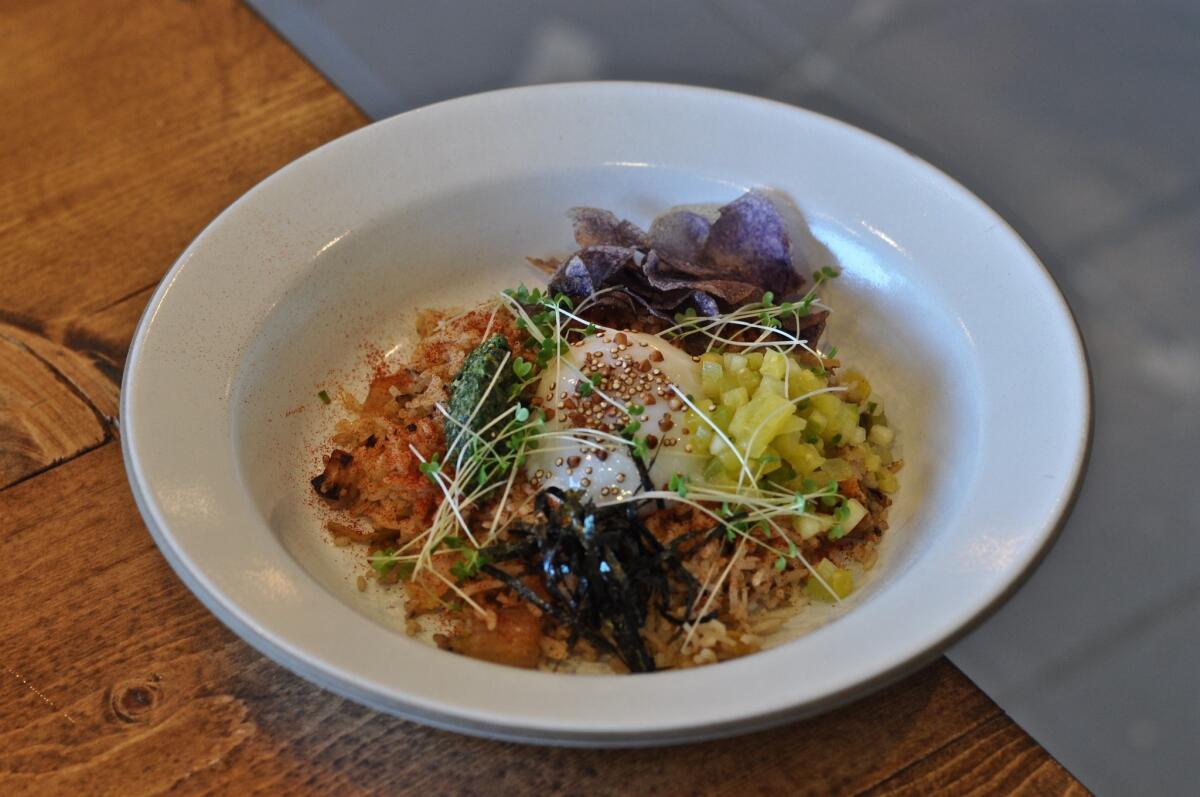Scouting Report: It’s worth finding this crappy Hollywood strip mall to eat at Baroo

Kimchi fried rice at Baroo includes a 63-degree egg, basmati rice, purple potato chips, roasted seaweed and pineapple-fermented kimchi.
- Share via
Name of restaurant: Baroo. The restaurant, which has been open about three weeks, is named for the food bowl that’s used by Buddhist monks. No sign, unless you count the L.A. County Health Department “A” in the window and the sandwich board listing their kombucha flavors. The tiny space is minimalist, all white, with little on the walls except for a chalkboard menu. There’s one large wooden communal table, which seats eight, a counter by the wall seating an additional eight, and a counter bar with three seats.
Where you are: In a crappy strip mall on the corner of Santa Monica Boulevard and Wilton Street in Hollywood. And though it’s a maxim that some of the best restaurants in this town are in crappy strip malls (Trois Mec!), this is crappier than most. A few storefronts, a big pile of construction lumber.
Who’s cooking: Chef Kwang Uh, who is from Seoul, went to culinary school at the CIA in Hyde Park, interned at Picholine, cooked at Daniel and Nobu Bahama, then staged at Noma before heading to L.A. to open this, his first restaurant.
Uh owns Baroo with Matthew Kim, his friend from school and a native of Andong, South Korea. Kim also helps run the restaurant, including serving your food. Three weeks in, it’s just a two-man show. Why Los Angeles? Because Kim had already moved here to work for a South Korean company. Because it’s cheaper than New York City and San Francisco. And because this is an “eco-friendly city,” to quote Uh. Ta-da.
What you’re eating: Uh is making intricate and highly inventive dishes that combine the food of his Korean heritage with local ingredients (including greens from Kim’s garden), techniques he picked up at culinary school and in world-class kitchens, and what comes off the shelves that also decorate the restaurant -- loaded with fermenting vats and pickle jars.
The seven dishes currently on the chalkboard menu are jigsaws of whole grains, fruits and vegetables, seaweeds and nuts and sauces. There’s kimchi fried rice with the pineapple-fermented kimchi Uh makes in the back, a 63-degree sous-vide egg, purple potato chips and roasted seaweed.
There’s the Bibim Salad with quinoa and bulgur, pickled vegetables, gochujang and passionfruit powder. And another bowl he’s orchestrated with kamut and farro, roasted koji ink creme, kombu dashi, nuts, fingerlimes and rose-onion pickles. And pickles, lots of pickles.
Who’s at the next table: Right now? Nobody. If you’re reading this, that might change.
What you’re drinking: Kombucha. There are vats of the stuff on the shelves with the pickles and various experiments, and cups of it in a little refrigerated case by the communal table. Uh makes it all in-house -- rose kombucha, lemon verbena kombucha, elderflower kombucha. Not sweet, not too fizzy, nicely acidic. Uh blames his current elderflower fascination on Noma: “They did everything with elderflower.”
Service: Because both times I’ve been at Baroo, it’s been just me or me and my teenage daughter, the service has been fantastic. Chat about culinary school and Danish foraging while Uh tells you how he makes pickles.
How to make Baroo’s pineapple kimchi: Cut up Napa cabbage, give it a dry brine with plenty of garlic and ginger. Pickle in pineapple juice, 4% salinity. Ferment for three days.
What the chef’s reading: If you’re sitting at the counter in front, you’ll see into the tiny, well-appointed kitchen to your left, and up to the chef’s bookshelf. Below the counter, Uh has out a big stack of cookbooks, many open, including Cory Lee’s “Benu,” “Fäviken” by Magnus Nilsson, “Never Trust a Skinny Italian Chef” by Massimo Boturra, something by Rene Redzepi, of course, and not a few cookbooks in Korean.
Info: 5706 Santa Monica Blvd., Hollywood, (323) 819-4344, baroola.strikingly.com. Open from 11 a.m. to 9 p.m. everyday.
Because taking pictures of food is almost as much fun as eating it, on Instagram @latimesfood
ALSO:
The Slanted Door is coming to DTLA
Do you know what a Guatemalan breakfast is? Here are 6 places to find out
Want a personal sommelier? Here are two new wine clubs you need to know about
More to Read
Eat your way across L.A.
Get our weekly Tasting Notes newsletter for reviews, news and more.
You may occasionally receive promotional content from the Los Angeles Times.











